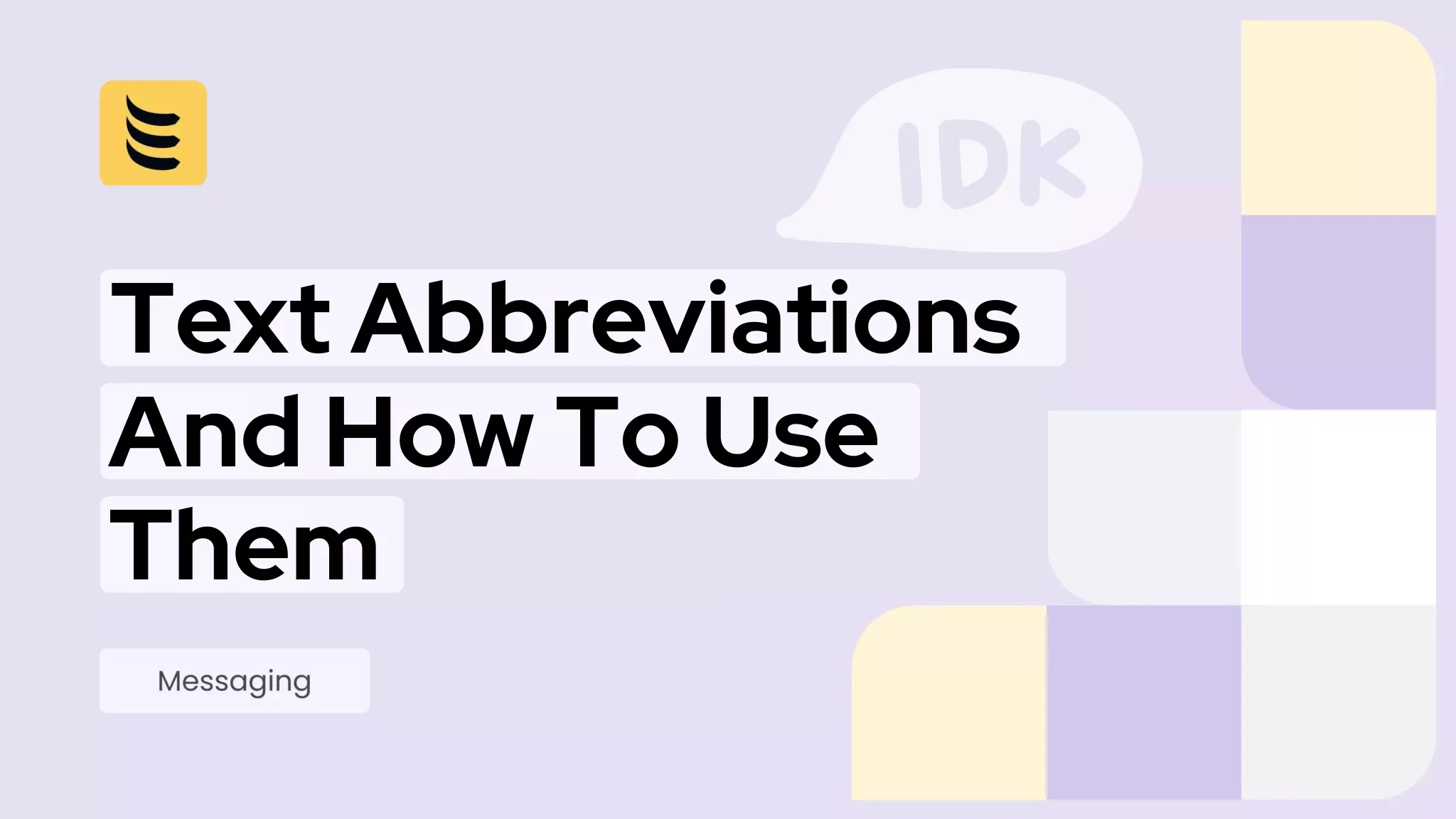Word or character count is often a limiting factor on text-based communications platforms. For example, message content might be constrained to an upper limit of individual characters, or a maximum number of words. A messaging platform might also base its pricing on the number of characters or words that you send.
To achieve maximum value from your text-based communications, it’s therefore a good idea, if you can limit the amount of content you transmit, while still maximizing its impact. This is where text abbreviations can come in handy.
What are Text Abbreviations?
Text abbreviations are shortened versions of a given word or phrase. You can use them to save on typing time and effort – and to limit the number of words or characters in a given communication. Typically, text abbreviations may be short phonetic representations of the word or phrase, or acronyms where each character stands for a particular word.
Your List of Current Text Abbreviations
There are currently hundreds of text abbreviations in standard use. We’ve assembled a comprehensive list, and presented them in logical sections as follows:
Standard Interactions and Transactions
?4U: I have a question for you
121: One to one
2: To (in texting)
2EZ: Too easy
2F4U: Too fast for you
2G2BT: Too good to be true
2M2H: Too much to handle
2MORO: Tomorrow
2NITE: Tonight
4: For (in texting)
AAMOF: As a matter of fact
AAQ: Assumed asinine question
AFK: Away from keyboard
ABC: Already been chewed
ABT: About
ADDY: Address
ADMIN : Administrator
ADN: Any day now
AFAIK: As far as I know
AH: At home
AIGHT: Alright
AISB: As it should be, or As I said before
AKA: Also known as
ALOL: Actually laughing out loud
AMIIC: Ask me if I care
APP: Application
A/S/L: Age/sex/location
ATB: All the best
AYDY: Are you done yet?
AYS: Are you serious?
AYT: Are you there?
B2W: Back to work
B4: Before
BAE: Before anyone else
BAK: Back at keyboard
BAU: Business as usual
BBL: Be back later
BBS: Be back soon
BC: Because
BCNU: Be seeing you
BD: Big deal
BDAY: Birthday
BFF: Best friends forever
BFD: Big freaking deal
BFN: Bye for now
BIF: Before I forget
BLNT: Better luck next time
BOL: Best of luck
BR: Best regards
BRB: Be right back
BRT: Be right there
BTDT: Been there, done that
BTW: By the way
BYOB: Bring your own beer
BYOC: Bring your own computer
BYOD: Bring your own device
BYTM: Better you than me
CHK: Check
CID: Consider it done
CLD: Could
CLK: Click
CMON: Come on
COB: Close of business
CRAY: Crazy
CRE8: Create
CU: See you
DBEYR: Don’t believe everything you read
DGT: Don’t go there
DIY: Do it yourself
DKDC: Don’t know, don’t care
DL: Download
DQMOT: Don’t quote me on this
DUPE: Duplicate
EAK: Eating at keyboard
EOBD: End of business day
EOD: End of day, or End of discussion
EOM: End of message
EZ: Easy
F2F: Face to face
FAQ: Frequently asked questions
FBM: Fine by me
FBOW: For better or worse
FIMH: Forever in my heart
FOAF: Friend of a friend
FOMO: Fear of missing out
FRT: For real though
FTBOMH: From the bottom of my heart
FTL: For the loss
FTW: For the win
FWIW: For what it’s worth
FWM: Fine with me
FYA: For your amusement
FYEO/4YEO: For your eyes only
FYI: For your information
G2CU: Good to see you
G2G: Got to go
GB: Goodbye
GB2W: Get back to work
GD: Good
GFI: Go for it
GL: Good luck
GOI: Get over it
GR8: Great
GRATZ: Congratulations
H8: Hate
HAND: Have a nice day
HRU: How are you?
HW: Homework
IAE: In any event
IC: I see
ICBW: It could be worse
ICYMI: In case you missed it
IDC: I don’t care
IDK: I don’t know
IFYP: I feel your pain
IGN: I’ve got nothing
ILY/ILU : I love you
IMHO: In my humble opinion
IMO: In my opinion
IMS: I am sorry
IMU: I miss you
IRL: In real life
ISO: In search of
ITYK: I thought you knew
IYKWIM: If you know what I mean
IYSS: If you say so
JIC: Just in case
JK: Just kidding
JW: Just wondering
K: OK
KK: Cool cool
KEWL: Cool
L8R: Later
LIC: Like I care
LMGTFY: Let me Google that for you
LOL: Laughing out loud
LOTI: Laughing on the inside
LTD: Living the dream
LTNS: Long time no see
LYSM: Love you so much
MEH: So-so or just OK
MHOTY: My hat’s off to you
MKAY: Mmm, OK
MYOB: Mind your own business
N00b: Newbie, novice
N2M: Not too much
NBD: No big deal
NGL: Not gonna lie
NFS: Not for sale
NIMBY: Not in my backyard
NLT: No later than
NM: Nothing much
NMU: Not much, you?
NOYB: None of your business
NP: No problem
NSFW: Not safe for work
NVM: Never mind
NWO: No way out
OBV: Obviously
OH: Overheard
OIC: Oh, I see
OMDB: Over my dead body
OMG: Oh my God
OMW: On my way
OP: Original poster, or Original post
OS: Operating system
OT: Off-topic
OTB: Off to bed
OTFL: On the floor laughing
OYO: On your own
PDA: Public display of affection
PEBCAK: Problem exists between chair and keyboard
PLS: Please
PM: Private message
POV: Point of view
PPL: People
PROLLY: Probably
PTL: Praise the Lord
PTMM: Please tell me more
Q4U: (I have a) question for you
QOTD: Quote of the day
QQ: Quick question
R: Are
RBTL: Read between the lines
RLY: Really
ROFL: Rolling on the floor laughing
ROFLCOPTER: Rolling on the floor laughing and spinning around
RTM: Read the manual
SH^: Shut up
SITD: Sitting in the dark
SK8: Skate
SLAP: Sounds like a plan
SMH: Shaking my head
SOL: Sooner or later
SRSLY: Seriously
SRY: Sorry
STBY: Sucks to be you
STR8: Straight
SUP: What’s up?
SUX: Sucks or “it sucks”
SYL: See you later
SYS: See you soon
TBH: To be honest
TCB: Take/Taking care of business
TGIF: Thank God it’s Friday
THX: Thanks
TIA: Thanks in advance
TIL: Today I learned
TL: Too long
TLC: Tender loving care
TL;DR: Too long; didn’t read
TMI: Too much information
TMOT: Trust me on this
TW: Trigger warning
TWSS: That’s what she said
TTYL: Talk to you later
TTYS: Talk to you soon
TYT: Take your time
TYSO: Thank you so much
UFN: Until further notice
UOK: Are you OK?
VM: Voicemail
VRY: Very
W/O: Without
WAH: Working at home
WAYF: Where are you from?
WBU: What about you?
W/E: Whatever
WFH: Work/Working from home
WH5: Who, what, when, where, why
WDYK: What do you know?
WDYT: What do you think?
WRK: Work
WTG: Way to go
WYSIWYG: What you see is what you get
WYD: What are you doing?
WYGAM: When you get a minute
WYWH: Wish you were here
XOXO: Hugs and kisses
Y: Why (?)
YHBW: You have been warned
YNK: You never know
Events and Scheduling
ASAP: As Soon As Possible
ATM: At the moment
BRB: Be right back
COB: Close of business
EOD: End of day
ETA: Estimated Time of Arrival
FBF: Flashback Friday
HBD: Happy birthday
RN: Right now
RSVP: Please respond to confirm that you’re able or unable to attend (from the French “Répondez S’il Vous Plaît”)
TBA: To Be Announced
TBC: To Be Confirmed
TBD: To Be Determined
TBT: Throwback Thursday
TMRW: Tomorrow
Marketing Terms
5G: 5th generation mobile communications
API: Application Programming Interface
B2B – Business to Business
B2C – Business to Consumer
BYOC: Bring Your Own Carrier
CPC: Cost per click
CR: Conversion rate
CTA: Call to action
CTR: Click-through rate
DSC – Dedicated Short Code
ea. mo. or /mth: Per Month (an approved CTIA abbreviation)
MMS: Multimedia Messaging Service
Mo: Month (an approved CTIA abbreviation)
Msg: Message (an approved CTIA abbreviation)
Msg&Data Rates May Apply: Message and Data Rates May Apply (an approved CTIA abbreviation)
/: Per (an approved CTIA abbreviation)
RCS: Rich communication services
ROI: Return on investment
SCN: Short Code Number
SMB: Small to medium-sized business
SMS: Short Message Service
SME: Small to medium-sized enterprise
TCPA: Telephone Consumer Protection Act
TOS: Terms of service
Txt: Text (an approved CTIA abbreviation)
UGC: User-generated content
UX: User experience
Slang and Colloquial
BAE: Affectionate or familiar for “baby”
BAMF: Bada** motherf*****
BF: Boyfriend
BFD: Big freaking deal
DILLIGAS: Do I look like I give a s***?
FAF: Funny as f***
FUBAR: F***ed up beyond all recognition
GF: Girlfriend
Gucci: Good, or cool
IDGAF: I don’t give a f***
It gives/It’s not giving: It’s good (or “It reminds me of…”) , or It’s not good.
LMAO: Laughing my a** off
LMFAO: Laughing my f****** a** off
Lowkey: Moderately, or kind of
LDR: Long-distance relationship
LOML: Love of my life
LTR: Long-term relationship
LULZ: Slang form of laughing out loud (LOL)
Mid: Mediocre
NFW: No f*****g way
No cap/No lie: I’m not lying
OMFG:Oh my f*****g God
OTP: One true pairing
PITA: Pain in the a**
PTFO: Pass the f*** out
PWN Own, or really get the better of
ROFLMAO: Rolling on the floor laughing my a** off
RTFM: Read the f*****g manual
Sending me: Something that excites or amuses you
SH: S*** happens
Slay: Good, or okay
SNAFU: Situation normal, all f***ed up
SOB: Son of a b****
STFU: Shut the f*** up
Sus: Suspicious or suspect
UFB Un-f******-believable
Vibe: A general feeling, or mood
WTF: What the f***
Social Media
BR: BeReal
DM: Direct message
FB: Facebook
FF: Follow Friday
IG or Insta: Instagram
IM: Instant message
LI: LinkedIn
OP: Original post
PM: Private message
PRT: Please Retweet (Twitter/X)
RT: Retweet
SC: Snapchat
SMP: Social media platform
STAN: STalker fAN. Though it can be derogatory, it now often refers to fans who are highly engaged and supportive of their favorite celebrities
TFTF: Thanks for the follow (X, etc.)
TMB: Tweet me back (Twitter/X)
TT: TikTok
WA: WhatsApp
X: formerly known as Twitter
YT: YouTube
Best Practices for Using Text Abbreviations
Given the vast choice of text abbreviations available, you might be tempted to rely on them entirely, for all your SMS marketing. However, you should bear in mind that not everyone receiving your messages will be familiar with what they mean – or for that matter, be comfortable with using them.
Therefore, it’s important to take a more balanced approach to using text abbreviations. The following recommendations will help.
Consider Your Audience
You should only use text abbreviations that your target audience will understand. You can use customer data, demographics, and records of their previous transactions to gain a better picture of what resonates with your designated recipients. Knowing your target audience will help in deciding whether text abbreviations are appropriate for a given campaign – and which ones you should and shouldn’t use.
Consider the Context
As well as your intended targets, you should take into account the context of the business/marketing discussion. Is it an internal communication with work colleagues that you’re on friendly terms with? Are you pitching a product or service to a potential client with traditional or conservative views?
These and other such considerations will help determine whether you should use text abbreviations or not. The context of your interactions will also dictate the kinds of abbreviations to use.
Keeping an eye on changes and evolution in the text abbreviations language will also help. Monitoring general developments in the language and the abbreviations that others in your industry are using will assist you in avoiding dated or inappropriate acronyms and phrases.
Make Sure It’s Compliant
Compliance with the relevant standards governing your SMS marketing can have as much influence on what you say as the need for clarity in your messaging. In this regard, the Cellular Telecommunications Industry Association (CTIA) has developed a list of approved abbreviations that you can use in your text marketing. These abbreviations can help you save space without sacrificing clarity.
Don’t Overdo It
Don’t try to fit too many texting abbreviations in a single text. While this may save on character and word count, the end result could make you look foolish and unprofessional. If in doubt, type out the full word.
Remember also that with Multimedia Messaging Service (MMS) capabilities, you can easily attach images or graphics to your messages, to improve clarity.
Use the Right Technology
Whatever your approach to text abbreviations, you’ll need a robust communications platform – one that fits the way you work, and readily provides for all your SMS marketing needs.
With the IDT Express Omnichannel Messaging Platform, you can experience the convenience of managing 15 different messaging apps all in one place. From SMS to WhatsApp, Viber, Telegram, Facebook Messenger, and more – you can implement all your preferred text abbreviations and streamline your communication strategy with ease. IDT’s cutting-edge SMS platform supports multimedia messaging via WhatsApp, Viber, and FB Messenger. Using IDT Express Link Shortening, you can also optimize your SMS messages by shortening URLs and tracking clicks.
The IDT Express Omnichannel Messaging Platform is designed to be easily integrated with other systems, providing seamless connectivity and ensuring a cohesive messaging strategy across your organization. The platform provides detailed analytics and reporting tools. So you can track the performance of your messaging campaigns, monitor engagement, and gather insights to optimize your communication strategy.
Getting started with IDT Express Omnichannel Messaging is easy! Simply sign up on our website and follow the onboarding process over email. Our user-friendly interface will guide you through the setup, and our support team is always available to assist you.
To find out more and set up a trial account, visit our website.




